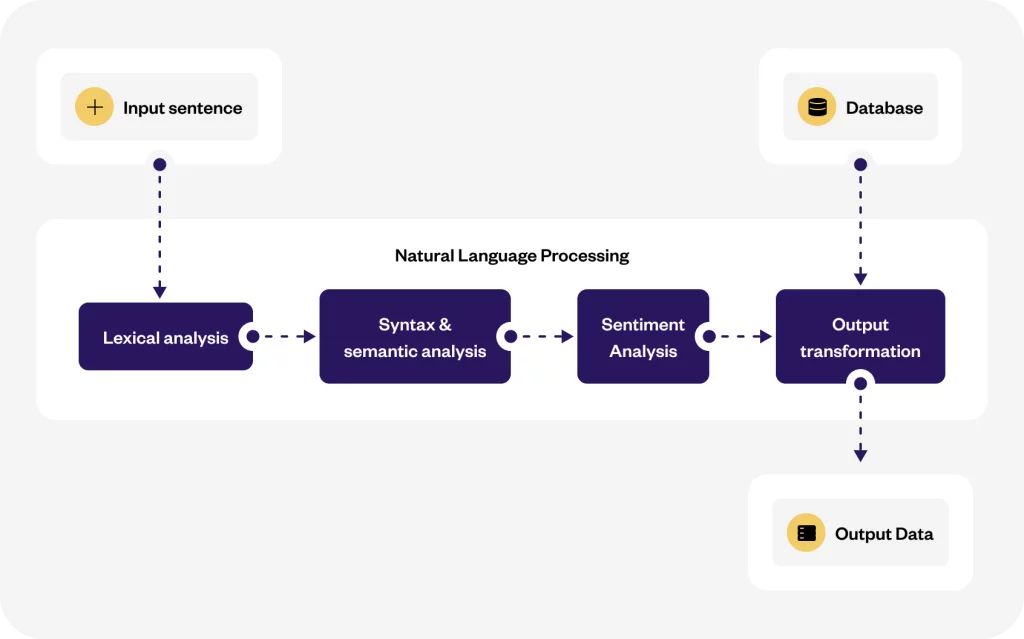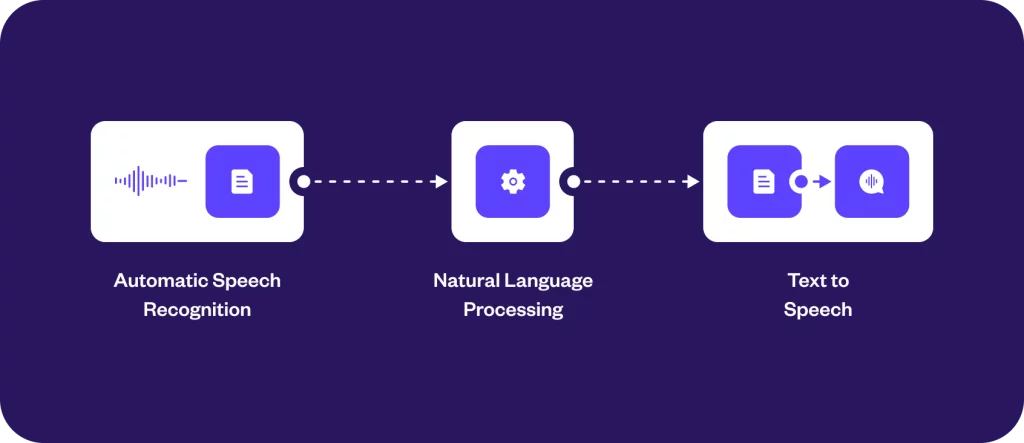In a rush and need the TL/DR version?
Summarize
Conversational AI is reshaping business landscapes, enhancing customer interactions through intelligent dialogue systems that mimic human conversation. This technology meets and anticipates customer needs, providing seamless, 24/7 service across various platforms.
Key insights:
- Defining conversational AI: AI that engages in human-like dialogues to enhance customer support and business operations.
- Business advantages: Streamlines operations, enhances customer satisfaction, and supports comprehensive communication strategies.
- Core components: Artificial Intelligence, Machine Learning, Natural Language Processing, and more for a robust interaction framework.
- Strategic impact: Offers businesses a competitive edge through efficiency and improved customer engagement.
- Implementation guide: Steps to integrate Conversational AI effectively into business practices, aligning with strategic goals.
Invest in this cutting-edge technology to secure a future where every customer interaction adds value to your business.
Note: This summary is not a substitute for reading the article in full, as you may miss out on important nuances.
Conversational AI is a transformative technology with a positive influence on all facets of businesses. From mimicking human interactions to making the customer and employee journey hassle-free — it’s essential first to understand the nuances of conversational AI. Our beginner’s guide is your one-stop shop for the same. Read on to know more.
In the present highly-competitive market, delivering exceptional customer experiences is no longer just good to have if businesses want to thrive and scale. Today’s customers are technically-savvy and demand instant access to support and service across physical and digital channels. That’s where Conversational AI proves to be true allies for driving results while also optimizing costs.
Whether through next-gen chatbots intelligent virtual assistants voice-enabled devices, businesses are now able to create dynamic AI agents that interact with humans in a way that is very close to how humans representatives would interact with their customers. This very fact has proven to be a powerful tool for customer support, sales & marketing, employee experience, and ITSM efforts across industries.
Related must read:
- Conversational AI for lead generation
- Conversational AI in retail
- Conversational AI in healthcare
- Conversational AI in insurance
- Conversational AI for Customer Service
- Conversational AI in banking
In this guide, you’ll also learn about its use cases, some real-world success stories, and most importantly, the immense business benefits conversational AI has to offer.
Let’s dive right in.
What is conversational AI?
Conversational AI refers to the cutting-edge field that involves creating computer systems with the ability to engage in human-like and interactive conversations. It harmoniously blends innovations in the field of natural language processing, machine learning, and dialogue management to achieve highly intelligent bots for text and voice channels. By doing so, conversational AI enables computers to understand and respond to user inputs in a way that feels like they are in a conversation with another human.
Today conversational AI is enabling businesses across industries to deliver exceptional brand experiences through a variety of channels like websites, mobile applications, messaging apps, and more! That too at scale, around the clock, and in the user’s preferred languages without having to spend countless hours in training and hiring additional workforce. That’s not all, most conversational AI solutions also enable self-service customer support capabilities which gives users the power to get resolution at their own pace from anywhere.
No matter the size of a business, conversational AI helps them drive ROI, boost customer satisfaction and build customer loyalty through data-backed strategies, anticipation of customer needs, and hyper-personalized communications. Not just that, conversational AI also simplifies operations, elevates customer support processes, significantly improves results from marketing efforts, and ultimately contributes to a business’s overall growth and success.
Why does your business need conversational AI in 2024?
Conversational AI is quickly becoming a must-have tool for businesses of all sizes. Why? Because it can help your business provide a better customer and employee experience, streamline operations, and even gain an edge over your competition.
- Customers today expect instant gratification and personalized attention, which conversational AI can deliver. According to a survey by Oracle, 80% of businesses plan to use chatbots or virtual assistants by 2024.
- With conversational AI, businesses can provide 24/7 support tailored to individual customer needs, eliminating long wait times and frustrating phone trees. Gartner predicts that by 2023, 25% of customer service and support operations will integrate virtual customer assistant (VCA) or chatbot technology.
- Implementing conversational AI enables businesses to make data-driven decisions, improve products, and target marketing efforts effectively. The global conversational AI market size is projected to reach $32 billion by 2023. (Allied Market Research)
- Implementing conversational AI can lead to increased sales and improved customer satisfaction.
eMarketer predicts that 126 million US adults will use voice assistants at least once per month. (eMarketer)
Components of conversational AI

Conversational AI brings together advanced technologies like NLP, machine learning, and more to create bots that can not only understand what humans are saying but also respond to them in a way that humans would.
There are four key components that are crucial to the whole process:
1. Machine learning
The first is Machine Learning (ML), which is a branch of AI that uses a range of complex algorithms and statistical models to identify patterns from massive data sets, and consequently, make predictions. ML is critical to the success of any conversation AI engine, as it enables the system to continuously learn from the data it gathers and enhance its comprehension of and responses to human language.

A common example of ML is image recognition technology, where a computer can be trained to identify pictures of a certain thing, let’s say a cat, based on specific visual features. This approach is used in various applications, including speech recognition, natural language processing, and self-driving cars. The primary benefit of machine learning is its ability to solve complex problems without being explicitly programmed, making it a powerful tool for various industries.
2. Natural Language Processing (NLP)
Natural Language Processing (NLP) is the second component that involves transforming unstructured data into a machine-readable format and processing it to produce an appropriate response. NLP is essential to conversation AI engines, as it allows the system to comprehend user input and produce relevant responses. It consists of five main processes: input generation, input analysis, syntactic and semantic analysis, and output transformation. The process of NLP involves several steps, including:

- Lexical analysis: Breaking down a text into individual words or phrases, known as tokens.
- Syntax and semantic analysis: Understanding the relationship between words and phrases in a sentence and analyzing the meaning of the text.
- Sentiment analysis: Analyzing the emotional tone of a text, such as positive, negative, or neutral.
- Output transformation: Producing human-like language based on a given input or context.
3. Data mining
The third component, data mining, is used in conversation AI engines to discover patterns and insights from conversational data that developers can utilize to enhance the system’s functionality. It is a method for identifying unknown properties, as opposed to machine learning, which focuses on generating predictions based on recent data.

A common example of data mining in AI is customer segmentation. By analyzing customer data such as purchase history, demographics, and online behavior, AI systems can identify patterns and group customers into segments based on their preferences and behaviors. This can help businesses to better understand their customers and target their marketing efforts more effectively.
4. Automatic Speech Recognition (ASR)
ASR is the final component of AI for voice-based conversations. It enables conversation AI engines to understand human voice inputs, filter out background noise, use speech-to-text to deduce the query and simulate a human-like response. There are two types of ASR software – directed dialogue and natural language conversations.

An example of an AI that can hold a complex conversation in action is a voice-to-text dictation tool that allows users to dictate their messages instead of typing them out. This can be especially helpful for people who have difficulty typing or need to transcribe large amounts of text quickly.
Overall, these four components work together to create an engaging conversation AI engine. This engine understands and responds to human language, learns from its experiences, and provides better answers in subsequent interactions. With the right combination of these components, organizations can create powerful conversational AI solutions that can improve customer experiences, reduce costs, and drive business growth.
How does conversational AI work?
Conversational AI is like having a smart computer that can talk to you and understand what you’re saying, just like a real person.
Here’s a more technical understanding of conversational AI:
Understanding your words:
When you talk or type something, the conversational AI system listens or reads carefully to understand what you’re saying. It breaks down your words into smaller pieces and tries to figure out the meaning behind them.
Making sense of it:
Once conversational AI understands your words, it uses its brain ( natural language processing) to make sense of them. It looks for patterns and tries to understand the context of what you’re saying. It can even recognize emotions in your words!
Finding the right response:
After understanding what you said, the conversational AI thinks fast and decides how to respond. It uses its memory to find the best answer. It may ask you additional questions to get more details or provide you with helpful information.
Learning and getting better:
The more people use conversational AI, the smarter it becomes. It learns from all the conversations it has and gets better at understanding different languages, accents, and even slang. It keeps improving over time!
Talking like a human:
The most amazing part is that the conversational AI can respond in a way that sounds just like a human. It can chat with you, answer your questions, and even make jokes. It tries its best to make the conversation feel natural and friendly
Conversational AI harnesses the power of Automatic Speech Recognition (ASR) and dialogue management to further enhance its capabilities. ASR technology enables the system to convert spoken language into written text, enabling seamless voice interactions with users. This allows for hands-free and natural conversations, providing convenience and accessibility.
Additionally, dialogue management plays a crucial role in conversational AI by handling the flow and context of the conversation. It ensures that the system understands and maintains the context of the ongoing dialogue, remembers previous interactions, and responds coherently. By dynamically managing the conversation, the system can engage in meaningful back-and-forth exchanges, adapt to user preferences, and provide accurate and contextually appropriate responses.
These components, combined with NLP and ML, contribute to the system’s ability to understand user inputs accurately and generate human-like responses, ultimately creating engaging and natural conversations that drive customer satisfaction and increase sales.
Types of conversational AI

1. AI chatbots
AI-powered chatbots are software programs that simulate human-like messaging interactions with customers. They can be integrated into social media, messaging services, websites, branded mobile apps, and more. AI chatbots are frequently used for straightforward tasks like delivering information or helping users take various administrative actions without navigating to another channel. They have proven excellent solutions for brands looking to enhance customer support, engagement, and retention.
The volume of interactions handled by conversational agents increased by as much as 250% in multiple industries since the pandemic. (Gartner)
Related must-reads:
- 9 Best chatbot examples for businesses by industry [2024]
- Future of Chatbots: Key Trends to Watch in 2024!
- Enterprise Chatbot – A Guide for Enterprises [2024]
- Benefits of AI Chatbots for Businesses and Customers
- Customer service chatbots: Benefits and examples [2024]
2. Voice bots
Voice bots are AI-powered software that allows a caller to use their voice to explore an interactive voice response (IVR) system. They can be used for customer care and assistance and to automate appointment scheduling and payment processing operations.
3. Interactive voice assistants
Interactive voice assistants (IVAs) are conversational AI systems that can interpret spoken instructions and questions using voice recognition and natural language processing. IVAs enable hands-free operation and provide a more natural and intuitive method to obtain information and complete activities.
Here are some real-life examples of interactive voice assistants (IVAs):
- Amazon Alexa: Alexa is a popular IVA developed by Amazon. It is integrated into devices like the Amazon Echo smart speakers. You can ask Alexa to play music, answer questions, control smart home devices, provide weather updates, set reminders, and much more.
- Apple Siri: Siri is Apple’s voice assistant available on iPhones, iPads, Macs, and HomePod smart speakers. You can ask Siri to make calls, send messages, set alarms, search the web, open apps, and perform various other tasks using voice commands.
- Google Assistant: Google Assistant is Google’s AI-powered voice assistant found on Android devices, Google Home speakers, and other smart devices. It can help you with tasks like setting reminders, playing music, making phone calls, providing directions, and accessing information from the web.
- Microsoft Cortana: Cortana is Microsoft’s virtual assistant available on Windows devices, including PCs and smartphones. It can assist with tasks such as sending emails, scheduling appointments, setting reminders, providing weather updates, and searching for information.
What is the difference between chatbots and conversational AI?
In the realm of automated interactions, while chatbots and conversational AI may seem similar at first glance, there are distinct differences between the two. Understanding these differences is crucial in determining the right solution for your needs.
| Feature | Traditional chatbots | Conversational AI Chatbot |
| Natural language processing (NLP) capability | Traditional chatbots typically rely on rule-based systems and predefined responses, making them limited in their ability to understand and respond to complex user queries | Conversational AI leverages advanced Natural Language Processing (NLP) techniques, enabling it to comprehend and interpret natural language inputs, resulting in more intelligent and contextually relevant responses. |
| Contextual understanding | Chatbots often lack contextual understanding, meaning they may struggle to maintain a coherent conversation or remember previous interactions. | Conversational AI employs sophisticated context-awareness mechanisms, allowing it to remember user preferences, track conversation history, and provide personalized responses based on context, leading to more engaging and seamless user experiences |
| Machine learning and self-Learning | Chatbots typically follow predefined scripts and require manual updates for improvements | Conversational AI harnesses the power of machine learning and deep neural networks enabling them to continuously learn from user interactions, and improve over time without manual intervention. |
| Multichannel, omnichannel and multimodal capabilities | Traditional chatbots are often limited to specific channels or platforms, such as websites or messaging apps, and are text-based | Conversational AI is designed to operate seamlessly across multiple channels, including voice assistants, mobile apps, and social media platforms. |
Another major differentiator of conversational AI is its ability to understand and respond to natural language inputs in a human-like manner. Unlike traditional chatbots or rule-based systems, conversational AI leverages advanced Natural Language Processing (NLP) techniques, including machine learning and deep neural networks, to comprehend the nuances of human language.
This enables conversational AI systems to interpret context, understand user intents, and generate more intelligent and contextually relevant responses. By bridging the gap between human communication and technology, conversational AI delivers a more immersive and engaging user experience, enhancing the overall quality of interactions.
Related- Chatbots vs conversational AI – What’s the difference?
What are the benefits of conversational AI chatbots?
Conversational AI offers several advantages, including cost reduction, faster handling times, increased productivity, and improved customer service. Let’s explore some of the significant benefits of conversational AI and how it can help businesses stay competitive.
1. Automate customer service tasks
Conversational AI is a game-changer in automating customer service tasks, making interactions with businesses more convenient and efficient. By leveraging advanced technologies like natural language processing (NLP) and machine learning, conversational AI brings several benefits to the table. Imagine finding answers to your questions or resolving common issues without waiting for a human agent. That’s exactly what conversational AI offers through its self-service options. AI-powered chatbots or virtual assistants can understand your queries, provide relevant information, and guide you toward solutions, saving you time and effort.
2. Expected global savings from chatbot usage
The implementation of chatbots worldwide is expected to generate substantial global savings. Studies indicate that businesses could save over $8 billion annually through reduced customer service costs and increased efficiency. Chatbots with the backing of conversational ai can handle high volumes of inquiries simultaneously, minimizing the need for a large customer service workforce. They provide 24/7 support, eliminating the expense of round-the-clock staffing. Self-service options and streamlined interactions reduce reliance on human agents, resulting in cost savings. While the actual savings may vary by industry and implementation, chatbots have the potential to deliver significant financial benefits on a global scale.
3. Gather valuable insights into user behavior
Conversational AI helps businesses gain valuable insights into user behavior. It allows companies to collect and analyze large amounts of data in real time, providing immediate insights for making informed decisions. With conversational AI, businesses can understand their customers better by creating detailed user profiles and mapping their journey. By analyzing user sentiments and continuously improving the AI system, businesses can personalize experiences and address specific needs. Conversational AI also empowers businesses to optimize strategies, engage customers effectively, and deliver exceptional experiences tailored to their preferences and requirements.
4. Reduce customer service cost and response times
With Conversational AI, businesses can achieve significant cost savings and improve response times in customer service. By implementing AI-powered chatbots and virtual assistants, companies can automate repetitive customer inquiries, allowing human agents to focus on more complex issues. These intelligent virtual assistants provide prompt and efficient responses, reducing wait times for customers. By offering 24/7 availability, businesses can address customer needs in real-time, enhancing the overall customer experience. Additionally, this automation reduces operational costs associated with staffing and training, resulting in significant savings.
5. Create opportunities for growth and innovation
Conversational AI brings exciting opportunities for growth and innovation across industries. By incorporating AI-powered chatbots and virtual assistants, businesses can take customer engagement to new heights. These intelligent assistants personalize interactions, ensuring that products and services meet individual customer needs. Valuable insights into customer preferences and behavior drive informed decision-making and targeted marketing strategies. Moreover, conversational AI streamlines the process, freeing up human resources for more strategic endeavors. It transforms customer support, sales, and marketing, boosting productivity and revenue.
6. Multilingual and omnichannel support
Conversational AI empowers businesses to connect with customers globally, speaking their language and meeting them where they are. With the help of AI-powered chatbots and virtual assistants, companies can communicate with customers in their preferred language, breaking down any language barriers. Furthermore, these intelligent assistants are versatile across various channels like websites, social media, and messaging platforms, making it convenient for customers to engage on their preferred platforms. This personalized and efficient support enhances customer satisfaction and strengthens relationships.
Examples of conversational AI
Conversational AI opens up a world of possibilities for businesses, offering numerous applications that can revolutionize customer engagement and streamline workflows. Here, we’ll explore some of the most popular uses of conversational AI that companies use to drive meaningful interactions and enhance operational efficiency.
Example 1 – Customer support automation
Conversational AI can automate customer care jobs like responding to frequently asked questions, resolving technical problems, and providing details about goods and services. This can assist companies in giving customers service around the clock and enhance the general customer experience.
According to a survey of 1,000 business and technology executives, ‘improving customer experiences’ was the area in which they realized the most value from AI initiatives. (PwC)
Example 2 – Customer engagement automation
Conversational AI can increase customer engagement by offering tailored experiences and interacting with customers whenever, wherever, across many channels, and in multiple languages.
Nearly 80% of CEOs have changed or intend to change how they manage customer engagement using conversational AI technologies. (Accenture)
Example 3 – Conversational commerce automation
Automating tasks associated with conversational commerce, such as making product suggestions, responding to consumer inquiries, and completing transactions, is possible with conversational AI. Companies may benefit from this to enhance the customer shopping experience and boost sales.
Opportunity for between 15 – 70% cost reduction, depending upon the customer channel interactions deflected into conversational AI-enabled channels (Deloitte)
Example 4 – HR automation
Using conversational AI, HR tasks like interview scheduling, responding to employee inquiries, and providing details on perks and policies can all be automated. HR departments can do this to save time and improve the employee experience.
According to a report by Oracle, 50% of HR leaders plan to use chatbots and other AI-powered tools in their talent acquisition processes by 2023. [ Oracle ]
Example 5 – ITSM automation
Additionally, conversational AI may be employed to automate IT service management duties, including resolving technical problems, giving details about IT services, and monitoring the progress of IT service requests.
90% of businesses that use chatbots for customer support saw just a $0.70 cost per interaction and saved up to 4 minutes per inquiry. (Juniper Research)
How to get started with conversational AI?
Now that you have a thorough grasp of conversational AI, its benefits, and its drawbacks, let’s explore the steps to introduce conversational AI into your organization immediately.

1. Consider your company’s long-term objectives
The first step in implementing conversational AI is considering your company’s long-term goals. What do you want to achieve using conversational AI? How do you envision it helping your company?
Defining your long-term goals guarantees that your conversational AI initiatives align with your business strategy. Make sure you ask the right questions and ascertain your strategic objectives before starting.
2. Analyze your budgetary constraints and available resources
Once you have determined the purpose of your chatbot, it is important to assess the financial resources and allocation capabilities of your business. If your business has a small development team, opting for a no-code solution would be ideal as it is ready to use without extensive coding requirements. However, for more advanced and intricate use cases, it may be necessary to allocate additional budget and resources to ensure successful implementation.
3. Identify your target audience
Once you’ve determined your long-term goals, the next step is to pinpoint your target audience. Who will communicate with your conversational AI system? What are their preferences and needs?
Employees, customers, and partners are just a handful of the individuals served by your company. Understanding your target audience can assist you in designing a conversational AI system that fits their demands while providing a great user experience.
4. Choose the right platform
Once you have a clear vision for your conversational AI system, the next step is to select the right platform. There are several platforms for conversational AI, each with advantages and disadvantages. Select a platform that supports the interactions you wish to facilitate and caters to the demands of your target audience.
You can also partner with industry leaders like Yellow.ai to leverage their generative AI-powered conversational AI platforms to create multilingual chatbots in an easy-to-use co-code environment in just a few clicks.
5. Start building your bot
Once you have decided on the right platform, it’s time to build your first bot. Start with a rudimentary bot that can manage a limited number of interactions and progressively add additional capability. Test your bot with a small sample of users to collect feedback and make any adjustments.
Get started with enhancing your bot’s performance today with our freemium plan! Continuously evaluate and optimize your bot to achieve your long-term goals and provide your users with an exceptional conversational experience.
Related read: How to create a chatbot – Best practices to follow in 2024
6. Evaluate metrics to measure performance
Collect valuable data and gather customer feedback to evaluate how well the chatbot is performing. Capture customer information and analyze how each response resonates with customers throughout their conversation. This valuable feedback will give you insights into what customers appreciate about interacting with AI, identify areas where improvements can be made, or even help you determine if the bot is not meeting customer expectations.
Related read: Customer experience vs customer service: More than just semantics
One of the best things about conversational AI solutions is that it transcends industry boundaries. Explore these case studies to see how it is empowering leading brands worldwide to transform the way they operate and scale.
Who is the leader in the conversational AI industry?
Yellow.ai is a recognized leader in the conversational AI platform space. As a leading provider of AI-powered chatbots and virtual assistants, Yellow.ai offers a comprehensive suite of conversational AI solutions.
We specialize in multilingual and omnichannel support covering 135+ global languages, and 35+ channels. With our multi-LLM architecture, continuously trained on billions of conversations for scalability, speed, and accuracy, we enable businesses to cut support costs by 60% with seamless automation across text, email, and voice.The Yellow.ai platform also offers rich analytics and insights to help businesses optimize their conversational AI strategies. With a strong track record and a customer-centric approach, we have established ourselves as a trusted leader in the field of conversational AI platforms.
Conversational AI – FAQs
What is a conversational AI strategy?
A conversational AI strategy refers to a plan or approach that businesses adopt to effectively leverage conversational AI technologies and tools to achieve their goals. It involves defining how conversational AI will be integrated into the overall business strategy and how it will be utilized to enhance customer experiences, optimize workflows, and drive business outcomes.
What industries are using conversational AI?
Conversational AI has become increasingly popular across various industries, thanks to its remarkable ability to improve customer engagement, automate processes, and deliver personalized experiences. Let’s take a closer look at some industries where conversational AI is making a significant impact:
Healthcare: Conversational AI has revolutionized healthcare by addressing various challenges and providing innovative solutions. It helps in healthcare by offering personalized patient support and education, automating appointment scheduling and reminders. It also conducts triage and symptom assessment, enabling remote monitoring and telemedicine, providing clinical decision support to healthcare professionals, and assisting healthcare staff with administrative tasks.
E-commerce: Online retailers have harnessed the power of conversational AI to transform the shopping experience. Through conversational interfaces like chatbots, customers can easily find products, get answers to order-related queries, and receive personalized recommendations. These AI-driven shopping assistants streamline the entire process, ensuring 24/7 support and leading to higher conversion rates and increased customer engagement.
Banking and Finance: Conversational AI has found its place in the banking and finance sector, revolutionizing how customers interact with financial institutions. Virtual assistants and chatbots equipped with conversational AI capabilities handle tasks such as balance inquiries, fund transfers, and account management. They offer personalized financial advice, automate routine transactions, and enhance the overall customer experience by providing quick and efficient assistance.
What is a key differentiator of conversational AI?
A differentiator of conversational AI is its ability to understand and respond to natural language inputs in a human-like manner. Unlike traditional chatbots or rule-based systems, conversational AI leverages advanced Natural Language Processing (NLP) techniques, including machine learning and deep neural networks, to comprehend the nuances of human language. This enables conversational AI systems to interpret context, understand user intents, and generate more intelligent and contextually relevant responses. By bridging the gap between human communication and technology, conversational AI delivers a more immersive and engaging user experience, enhancing the overall quality of interactions.
How do you build a conversational AI?
It’s important to note that building a conversational AI can be a complex and iterative process. It requires expertise in natural language processing (NLP), machine learning, and software engineering. Additionally, ongoing maintenance and improvements are necessary to ensure the conversational AI stays up-to-date and provides a satisfactory user experience.
Here’s a general overview of the process:
Define the use case: Determine the purpose and goals of your conversational AI. Decide what tasks or information you want it to handle, such as answering customer inquiries, providing recommendations, or assisting with specific tasks.
Data collection: Gather a substantial amount of data relevant to your use case. This data could include conversations, FAQs, knowledge bases, or any other relevant information. The quality and diversity of the data are crucial for training an effective conversational AI.
Data preprocessing: Clean and preprocess the collected data. This step involves removing noise, formatting the data appropriately, and ensuring it’s in a suitable structure for training.
Training: Utilize machine learning techniques to train your conversational AI model. One common approach is using a deep learning architecture like a sequence-to-sequence or transformer model. Training involves feeding the preprocessed data to the model and optimizing it to generate accurate and coherent responses.
Natural language understanding (NLU): Implement an NLU component to understand user input. NLU helps extract the intent and entities from user queries, allowing your conversational AI to understand user requests accurately. Techniques, such as named entity recognition and intent classification, are commonly used in NLU.
However, rather than starting from scratch, enterprises can also leverage Yellow.ai’s pre-built conversational AI frameworks. These frameworks provide a solid foundation and include pre-trained models, dialog management systems, and response generation capabilities. The best part? These solutions often come with pre-built knowledge bases, domain-specific language models, and industry-specific integrations. By using these solutions, enterprises can significantly reduce development time and quickly deploy conversational AI systems specific to their industry, such as healthcare, finance, or e-commerce.
Do I need to know how to code to build conversational AI?
No, you don’t necessarily need to know how to code to build conversational AI. There are platforms with visual interfaces, low-code development tools, and pre-built libraries that simplify the process. Using Yellow.ai’s Dynamic Automation Platform – the industry’s leading no-code development platform, you can effortlessly build intelligent AI chatbots and enhance customer engagement. The best part? You can leverage our 150+ pre-built templates to quickly construct customized customer journeys and deploy AI-powered chat and voice bots across multiple channels and languages, all without the need for coding expertise.
How can conversational AI enhance customer engagement and support?
Conversational AI can greatly enhance customer engagement and support by providing personalized and interactive experiences. Through human-like conversations, these tools can engage potential customers, swiftly understand their requirements, and gather initial information to qualify leads effectively. This personalized approach not only accelerates the lead qualification process but also enhances the overall customer experience by providing tailored interactions. By harnessing the power of conversational AI, businesses can streamline their lead-generation efforts and ensure a more efficient and effective sales process.
How can I build a chatbot or virtual assistant using conversational AI?
To build a chatbot or virtual assistant using conversational AI, you’d have to start by defining your objectives and choosing a suitable platform. Design the conversational flow by mapping out user interactions and system responses. AI bots usually need a lot of training it with relevant data and algorithms, but with multi-LLM architecture based platforms like Yellow’ai you wouldn’t have to worry about that since the models are being constant trained on 2B+ conversations every quarter to ensure seamless and human-like conversations.
How can a conversational AI platform help?
Implementing a conversational AI platforms can automate customer service tasks, reduce response times, and provide valuable insights into user behavior. By combining natural language processing and machine learning, these platforms understand user queries and offers relevant information. They also enable multi-lingual and omnichannel support, optimizing user engagement. Overall, conversational AI assists in routing users to the right information efficiently, improving overall user experience and driving growth.
What is NLP in conversational AI?
NLP, or Natural Language Processing, is like the language skills of conversational AI. Just as we humans understand and respond to language, NLP helps AI systems understand and interact with human language. It’s all about teaching computers to understand what we’re saying, interpret the meaning, and generate relevant responses. NLP algorithms analyze sentences, pick out important details, and even detect emotions in our words. With NLP in conversational AI, virtual assistant, and chatbots can have more natural conversations with us, making interactions smoother and more enjoyable. It’s like giving AI the ability to speak our language.
Yellow.ai has it’s own proprietary NLP called DynamicNLP™ – built on zero shot learning and pre-trained on billions of conversations across channels and industries. DynamicNLP™ elevates both customer and employee experiences, consistently achieving market-leading intent accuracy rates while reducing cost and training time of NLP models from months to minutes.
What is the future outlook for conversational AI and its impact on industries?
Conversational AI is set to shape the future of how businesses across industries interact and communicate with their customers in exciting ways. It will revolutionize customer experiences, making interactions more personalized and efficient. Imagine having a virtual assistant that understands your needs, provides real-time support, and even offers personalized recommendations. It will continue to automate tasks, save costs, and improve operational efficiency. With conversational AI, businesses will create a bridge to fill communication gaps between channels, time periods and languages, to help brands reach a global audience, and gather valuable insights.
Furthermore, cutting-edge technologies like generative AI is empowering conversational AI systems to generate more human-like, contextually relevant, and personalized responses at scale. It enhances conversational AI’s ability to understand and generate natural language faster, improves dialog flow, and enables continual learning and adaptation, and so much more. By leveraging generative AI, conversational AI systems can provide more engaging, intelligent, and satisfying conversations with users.
It’s an exciting future where technology meets human-like interactions, making our lives easier and more connected.



















